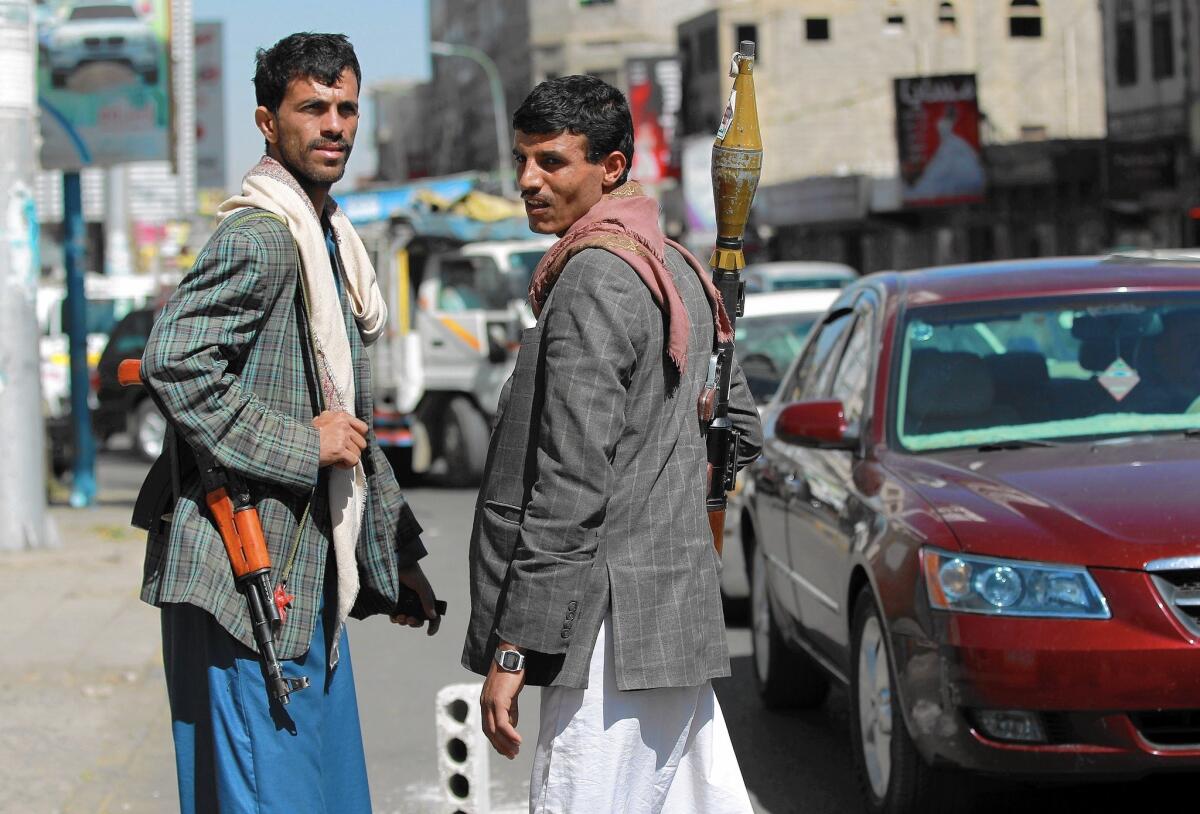In Yemen, Houthi rebels’ gains could have wide repercussions

- Share via
The violent upheaval in Yemen’s capital this week has raised fear of a power vacuum at the heart of a country regarded as crucial to U.S. counter-terrorism efforts in the Middle East.
The country, which is beset by political turmoil and sporadic violence, occupies a strategic position at the crossroads of some of the world’s busiest shipping lanes in the Red Sea and Gulf of Aden and is home to one of Al Qaeda’s most dangerous franchises.
Its government has given U.S. forces wide latitude to carry out drone strikes against the militants, who stand to benefit from the rapidly deteriorating security situation.
Houthi rebels reportedly reached a power-sharing deal Wednesday with President Abdu Rabu Mansour Hadi after defeating his guards. But the agreement leaves unclear who is in charge after Hadi and his government offered to resign Thursday.
Who are the Houthis?
The Houthis, an insurgent group based in the north of Yemen, belong to a Shiite Muslim offshoot known as the Zaidi sect that accounts for about a third of the country’s 26 million people.
They take their name from Hussein Houthi, who led an uprising in 2004 against the U.S.-allied president at the time, Ali Abdullah Saleh, that capitalized on popular anger over the American-led invasion of Iraq. Houthi was killed in 2004, but his family fought on until a cease-fire was reached in 2010.
In 2011, Houthis joined in protests against Saleh inspired by the “Arab Spring” uprisings that were roiling the region.
Since Saleh’s ouster the following year, the rebels have strengthened their military hold over the northern provinces of Saada and Amran, while broadening their popular appeal by supporting fuel subsidies that help the poor and demanding the replacement of corrupt officials.
In September, Houthi fighters entered the capital, Sana, largely unopposed, setting up checkpoints and eventually taking control of key government and military installations.
What do the Houthis want?
Analysts suggest that the Houthis, now led by Abdel-Malek al-Houthi, are more interested in increasing their representation in government than in taking over the country. But they in effect wield the power in Sana.
In a lengthy speech late Tuesday, their leader demanded the full integration of Houthis into the state, saying Hadi’s rule had empowered Al Qaeda in the Arabian Peninsula and allowed corruption to spread, the Associated Press reported.
The deal reached Wednesday expands their presence in government institutions and in negotiations for a new constitution, while postponing decisions on contentious issues such as the structure of a new federal system, according to Yemen’s state-run news agency. The Houthis oppose a plan to divide the nation into six regions, which they see as a dilution of their power.
Does Iran have a hand in this?
Analysts describe the clashes as the latest phase in a proxy war between factions supported by Sunni Muslim powerhouse Saudi Arabia, which borders Yemen, and Shiite groups backed by Iran.
Yemeni authorities have intercepted weapons shipments from Iran, which they allege were destined for the Houthis. But the rebels deny the link, and it remains unclear to what extent Iran may be driving events in Yemen.
Some analysts argue that Iran is well aware that the Houthis can’t run the country and has no interest in creating a power vacuum that would leave the capital vulnerable to Sunni extremists from Al Qaeda and could provoke Saudi Arabia to send in troops.
What does this mean for counter-terrorism operations in Yemen?
The U.S. and the Houthi rebels share a common enemy in Al Qaeda in the Arabian Peninsula and there has been considerable fighting between the groups. The Al Qaeda affiliate claimed responsibility for the attack on the satirical publication Charlie Hebdo in Paris and is believed to have trained at least one of the brothers who carried out the massacre.
Analysts note, however, that the Houthis are also virulently opposed to American airstrikes and the presence of U.S. special forces in the country.
“If the government becomes even weaker than it already is, or if it is forced to make compromises with the Houthis who are also very anti-American, it seems that this is going to interrupt the U.S. counter-terrorism operations in Yemen,” said Jeffrey Bale, an expert on extremist groups at the Middlebury Institute of International Studies at Monterey.
Times staff writer Carol J. Williams contributed to this report.
For more international news, follow @alexzavis
More to Read
Sign up for Essential California
The most important California stories and recommendations in your inbox every morning.
You may occasionally receive promotional content from the Los Angeles Times.











